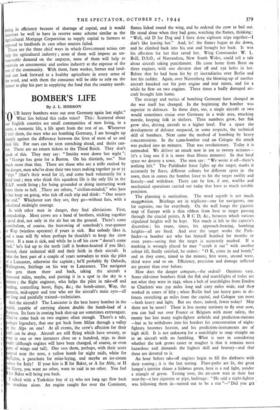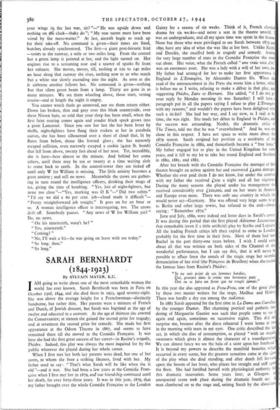BOMBER'S LIFE
By J. L. HODSON'
,0 UR heavy bombers were out over Germany again last night." What lies behind this radio voice? This: Scattered about our English counties are small communities of men living, in a sense, a monastic life, a life apart from- the rest of us. Whenever I visit them, the men who are bombing Germany, I am brought up sharply against the difference between the lives of most of us and their life. For ours can be seen stretching ahead, and theirs can- not. There are no return tickets to the Third Reich. They don't speak of this. They may say : "Smithy went down last night ";
• 1- "George has gone for a Burton. On his thirtieth, too." Not much more than that. There are those who are a trifle exalted by he danger, men who've done their two tours making together 5o or 55 trips" (that's their word for it), and come back voluntarily for a :hird tour ; men who think this squadron life is the only life in the R.A.F. worth living ; for being grounded or doing instructing work r■ores them to hell. _There are others, "civilian-minded," who hate .t but keep on going, who tick off each trip and think: "One nearer he end." Whichever sort they are, they go—without fuss, with a ,alculated midnight courage.
As with other men in danger, they find alleviations. First, .omradeship. Most crews are a band of brothers, sticking together
good deal, not only in the air but on the ground. There's some onnibalism, of course, the borrowing of somebody's rear-gunner or Wop (wireless operator) if yours is sick. But nobody likes it, and a man will fly when perhaps he shouldn't to keep the crew intact. If a man is sick, and while he is off his crew "doesn't come back," he's fed- up to the teeth (call it broken-hearted if you like). second, their technical skill and their faith in their aircraft. It
es the best part of a couple of years nowadays to train the pilot of a Lancaster, otherwise the captain ; he'll probably fly Oxfords, ellingtons, Stirlings on his way to Lancasters. The navigator ho gets them there and back, taking the aircraft a thousand miles, maybe, and putting it in a spar in the sky to a ute ; the flight engineer, who helps the pilot in take-off and ding, controlling boost, flaps, &c.; the bomb-aimer, Wop, the nners, mid-upper and rear who are the aircraft's main eyes—all e long and painfully trained—technicians.
And the aircraft? The Lancaster is the best heavy bomber in the orld, capable of carrying almost double the bomb-load of a ortress. Its feats in coming back shot-up are sometimes extravagant. ey've come back on two engines often enough. There's a talc, erhaps legendary, that one got back from Milan through a valley the Alps on one! At all events,' the crew's affection for their E can be deep. Aircraft are still flying which have seventy, or 'en in one or two instances dose on a hundred, trips to their edit (although engines will have been changed, of course, or even arts of wings and tail). One sees them, perhaps, with their score ainted near the nose, a yellow bomb for night raids, white for ylights, a parachute for mine-laying, and maybe an ice-cream met for Italy! If your kite is B for Baker, or A for Able, or H or Harry, you want no other, want to 'raid in no other. You feel for Baker will bring you back.
talked with a Yorkshire boy of 23 who not long ago flew back s machine alone. An engine caught fire over the Continent,
flames licked round the wing, and he ordered the crew to bail out. He stood alone when they had gone, watching the flames, thinking : "Well, old D for Dog and I have done eighteen trips together—I don't like leaving her." And, lo! the flames began to die down, and he climbed back into his seat and brought her back. It was his affection for her that saved her. Wing Commander W. L. Brill, D.S.O., of Narrandera, New South Wales, could tell a tale about aircraft taking punishment. He came home from Brest on three engines, with one elevator shot off and 15o holes in her. Before that he had been hit by 27 incendiaries over Berlin and lost his rudder. Again, over Nuremberg the blowing-up of another aircraft knocked out his port engine and rear turret, and for a while he flew on two engines. Three times a badly damaged air- craft brought him home.
The strategy and tactics of bombing Germany have changed as the war itself has changed. In the beginning the bomber was superior to defences. In those days, too, a single aircraft or two would sometimes cruise over Germany in a wide area, attacking morale, keeping folk in shelters. Then numbers grew, but flak grew also, driving aircraft to a higher level. For a space the development of defence outpaced, in some respects, the technical skill of bombers. Next came the method of bombing by heavy concentrations. In the r,000-bomber raid on Cologne the attack was packed into 90 minutes. That was revolutionary. Today it is outmoded. We deliver an attack now in ten to twenty minutes— (it's a long one if it is more than fifteen minutes). In that brief space we destroy a town. The men say : "We wrote it off—there's nothing left." The Pathfinder force lights up the target, marks it accurately by flares, different colours for different spots in the town, then in comes the bomber force to hit the target swiftly and fiercely—and withdraw. There can be few, if any, warlike and mechanical operations carried out today that have as much terrible precision.
The planning is meticulous. The word superb is not much exaggeration. Briefings are in triplicate—one for navigators, one for captains, one for everybody. On the wall hangs the gigantic map of Europe with a thin ribbon from base to target passing through the crucial points, A B C D, &c., between which various stipulated heights will be kept. Not much is left to the captain's discretion ; his route, times, his approach-bearing, bombing heights—all are fixed. And over the target works the Path- finder—a bomber ace who has himself bombed for months or even years—seeing that the target is accurately marked. If a marking is wrongly placed he may "scrub it out" with another colour till, finally satisfied, he orders : "0 K, come in and bomb," and in they come, timed to the minute, first wave, second wave, third wave and so on. Efficiency, precision and damage inflicted are greater than ever before.
How does the danger compare,—the ordeal? Opinions vary. Some old-timer bombers think the flak and searchlights of today are not what they were in 1942, when a belt of searchlights from Emdcn to Charleroi was 250 miles long and sixty miles wide, and they worked in cones of fifty ; when Berlin had soo heavy guns in de- fences stretching 40 miles from the capital, and Cologne 500 more —both heavy and light But are there, indeed, fewer today? May there not be more? There is less enemy territory to fly over now, you can bail out over France or Belgium with more safety, the enemy has lost many night-fighter airfields and prediction-stations —but as he withdraws into his borders his concentration of night. fighters becomes heavier, and his prediction-instruments are of high skill. It is not unknown for a searchlight to snap straight on to an aircraft with no fumbling. What is sure in considering whether the task grows easier or tougher is that it remains most hazardous and, demands the highest skill and bravery—and that these are devoted to it.
An hour before take-off engines begin to fill the darkness with their roaring ; it is the last testing. Flare-paths are lit, the great hangar's interior shines a hideous green, here is a red light, yonder a triangle of green. Testing 'over, the air-crew wait in their hut near-by—a last cigarette or pipe, badinage: "He said a night-fighter was following them in—turned out to be a star "—" Did you get
your wings iq the last war, sir? "—" He was upside down and nothing on the clock—shaky do "; "My rear turret must have been wired by The mess-waiter." At last, aircraft begin to stack up for their take-off. No command is given—their times are fixed, ivatchea already synchronised. The first—a giant post-historic bird —taxies to the runway, a mile or two miles long. From the control hut a green lamp is pointed at her, and the light turned on. Her engines rise to a screaming roar and a spatter of sparks fly from her exhaust. She moves, moves, till, rushing at 120 to 140 miles an hour along that runway she rises, nothing now to us who watch but a white star slowly ascending into the night. As soon as she is airborne another follows her. No command is given—nothing but that silent green beam from a lamp. Thirty are gone in as many minutes. We see them wheeling above, those stars, setting course—and at length the night is empty.
You cannot watch thein go unmoved, nor see them return either. Dawn has broken, thin and grey over this bleak countryside, over these Nissen huts, so cold that your sleep has been small, when the first faint roaring comes again and yonder black speck grows into a great Lancaster. Since you saw her last she has been beset by shells, night-fighters have flung their rockets at her in parabola curves, she has been silhouetted over a sheet of cloud that, lit by flares from below, shone like frosted glass ; she has narrowly escaped collision, even narrowly escaped a cookie (4,000 lb. bomb) that fell from above, twenty feet ahead of her nose. Yet, incredibly, she is here—here almost to the minute. And behind her come others, until there may be ten or twenty at a time waiting aloft to come back to earth. In the control-tower they are ticked off until only W for William is missing. The little anxiety becomes a great anxiety ; and still no news. Meanwhile the crews are gather- ing in turn round the intelligence officers, drinking their mugs of tea, giving the time of bombing. "Yes, lots of night-fighters, but none too close "—"Yes, marking was 0 K "—" Did two orbits" "I'd say we did a 6o per cent. job—cloud made it difficult "— " Pretty straightforward. job tonight." It goes on for an hour or so. A woman intelligence officer is interrogating, too. The crews drift off. Somebody pauses. "Any news of W for William yet?" No, no news.
"On his nineteenth, wasn't he?"
"Yes, nineteenth."
"Coming? "
"No, I'll wait a bit—he was going on leave with me teday."
"So long. then."
" So long."



























 Previous page
Previous page